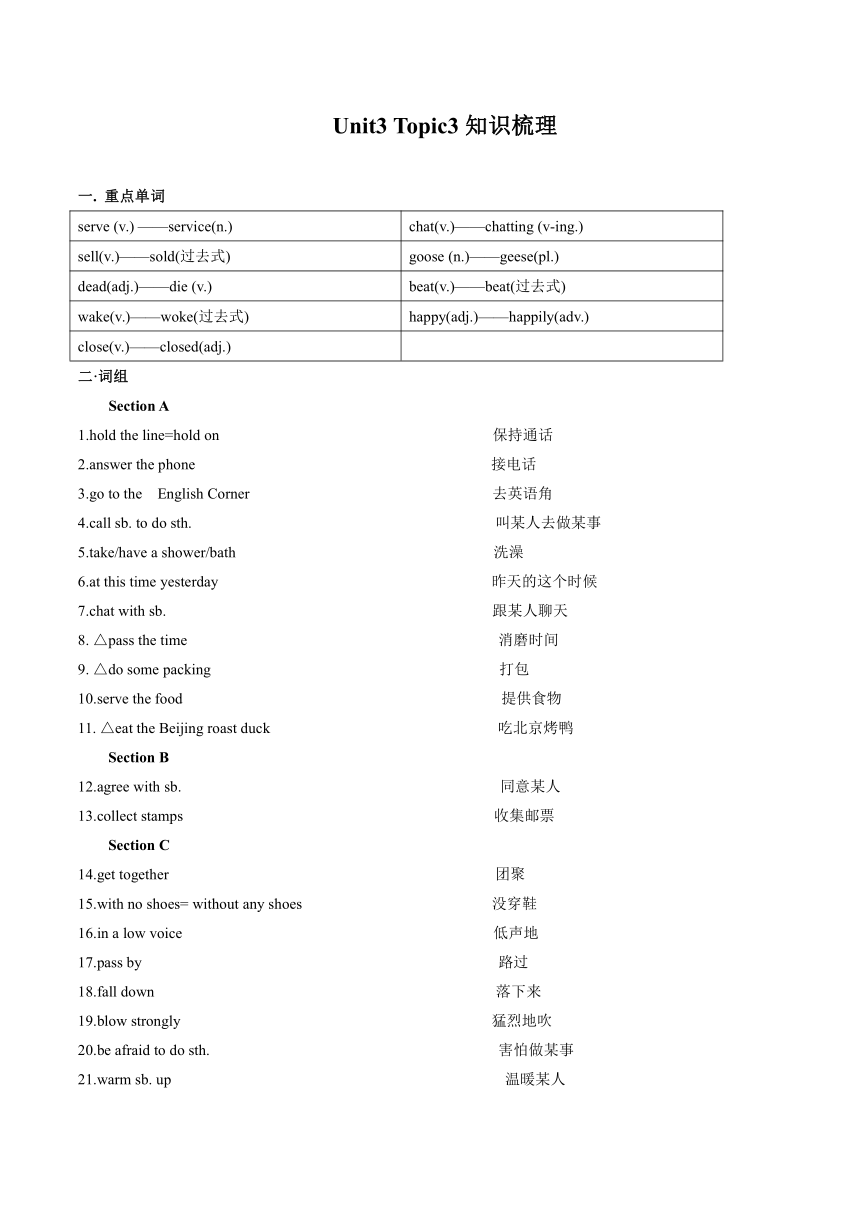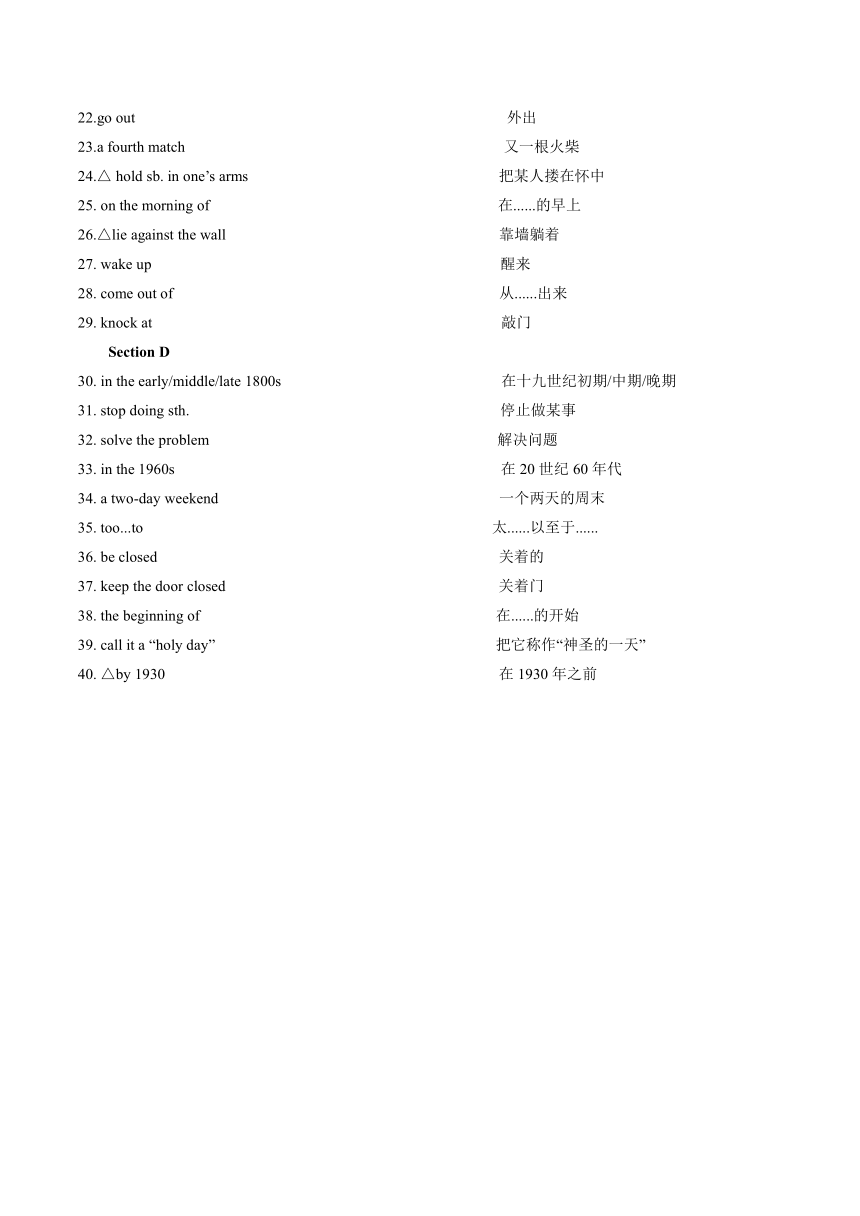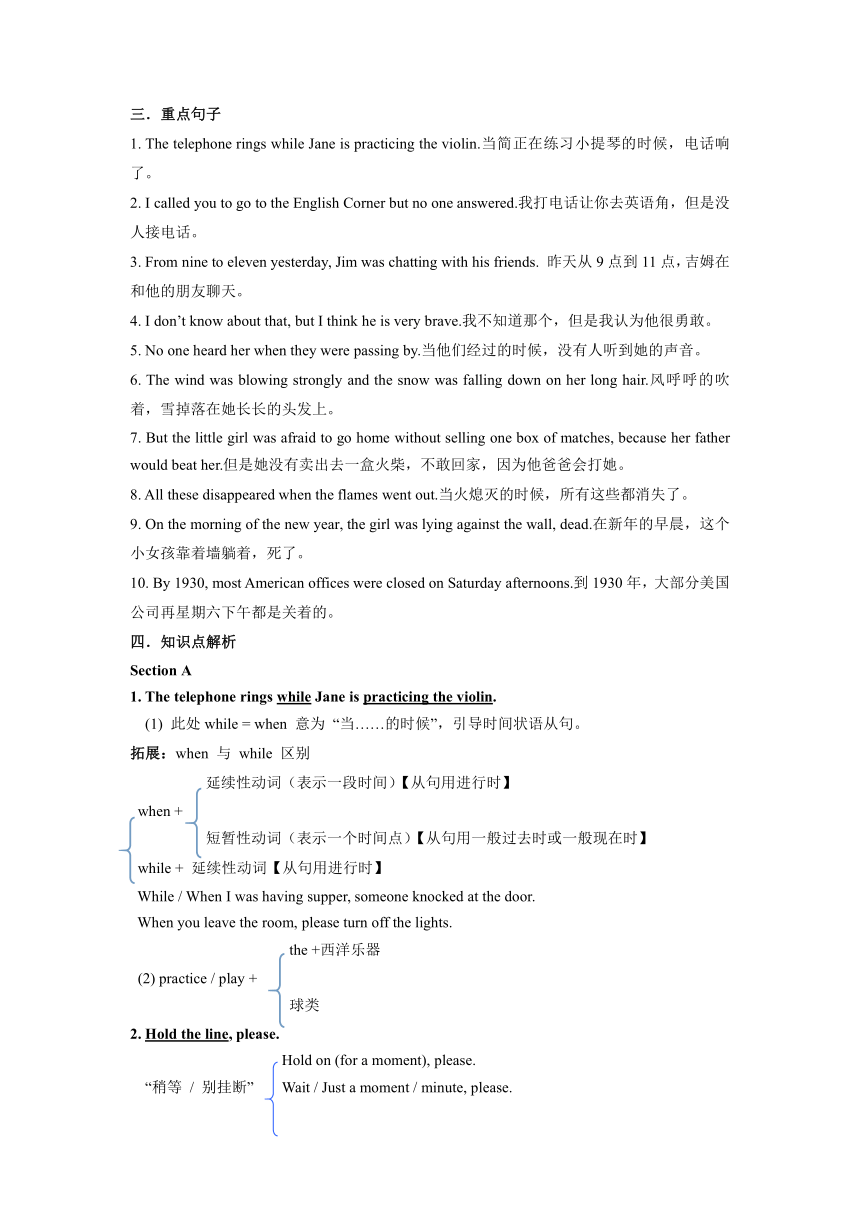仁爱版英语八年级上册 Unit 3 Topic 3 What were you doing at this time yesterday 知识梳理
文档属性
| 名称 | 仁爱版英语八年级上册 Unit 3 Topic 3 What were you doing at this time yesterday 知识梳理 |

|
|
| 格式 | docx | ||
| 文件大小 | 33.2KB | ||
| 资源类型 | 教案 | ||
| 版本资源 | 仁爱科普版 | ||
| 科目 | 英语 | ||
| 更新时间 | 2022-08-24 13:51:00 | ||
图片预览



文档简介
Unit3 Topic3知识梳理
重点单词
serve (v.) ——service(n.) chat(v.)——chatting (v-ing.)
sell(v.)——sold(过去式) goose (n.)——geese(pl.)
dead(adj.)——die (v.) beat(v.)——beat(过去式)
wake(v.)——woke(过去式) happy(adj.)——happily(adv.)
close(v.)——closed(adj.)
二·词组
Section A
1.hold the line=hold on 保持通话
2.answer the phone 接电话
3.go to the English Corner 去英语角
4.call sb. to do sth. 叫某人去做某事
5.take/have a shower/bath 洗澡
6.at this time yesterday 昨天的这个时候
7.chat with sb. 跟某人聊天
8. △pass the time 消磨时间
9. △do some packing 打包
10.serve the food 提供食物
11. △eat the Beijing roast duck 吃北京烤鸭
Section B
12.agree with sb. 同意某人
13.collect stamps 收集邮票
Section C
14.get together 团聚
15.with no shoes= without any shoes 没穿鞋
16.in a low voice 低声地
17.pass by 路过
18.fall down 落下来
19.blow strongly 猛烈地吹
20.be afraid to do sth. 害怕做某事
21.warm sb. up 温暖某人
22.go out 外出
23.a fourth match 又一根火柴
24.△ hold sb. in one’s arms 把某人搂在怀中
25. on the morning of 在......的早上
26.△lie against the wall 靠墙躺着
27. wake up 醒来
e out of 从......出来
29. knock at 敲门
Section D
30. in the early/middle/late 1800s 在十九世纪初期/中期/晚期
31. stop doing sth. 停止做某事
32. solve the problem 解决问题
33. in the 1960s 在20世纪60年代
34. a two-day weekend 一个两天的周末
35. too...to 太......以至于......
36. be closed 关着的
37. keep the door closed 关着门
38. the beginning of 在......的开始
39. call it a “holy day” 把它称作“神圣的一天”
40. △by 1930 在1930年之前
三.重点句子
1. The telephone rings while Jane is practicing the violin.当简正在练习小提琴的时候,电话响了。
2. I called you to go to the English Corner but no one answered.我打电话让你去英语角,但是没人接电话。
3. From nine to eleven yesterday, Jim was chatting with his friends. 昨天从9点到11点,吉姆在和他的朋友聊天。
4. I don’t know about that, but I think he is very brave.我不知道那个,但是我认为他很勇敢。
5. No one heard her when they were passing by.当他们经过的时候,没有人听到她的声音。
6. The wind was blowing strongly and the snow was falling down on her long hair.风呼呼的吹着,雪掉落在她长长的头发上。
7. But the little girl was afraid to go home without selling one box of matches, because her father would beat her.但是她没有卖出去一盒火柴,不敢回家,因为他爸爸会打她。
8. All these disappeared when the flames went out.当火熄灭的时候,所有这些都消失了。
9. On the morning of the new year, the girl was lying against the wall, dead.在新年的早晨,这个小女孩靠着墙躺着,死了。
10. By 1930, most American offices were closed on Saturday afternoons.到1930年,大部分美国公司再星期六下午都是关着的。
四.知识点解析
Section A
1. The telephone rings while Jane is practicing the violin.
(1) 此处while = when 意为 “当……的时候”,引导时间状语从句。
拓展:when 与 while 区别
延续性动词(表示一段时间)【从句用进行时】
when +
短暂性动词(表示一个时间点)【从句用一般过去时或一般现在时】
while + 延续性动词【从句用进行时】
While / When I was having supper, someone knocked at the door.
When you leave the room, please turn off the lights.
the +西洋乐器
(2) practice / play +
球类
2. Hold the line, please.
Hold on (for a moment), please.
“稍等 / 别挂断” Wait / Just a moment / minute, please.
Hold a second.
3. I called you to go to the English Corner but no one answered.
call sb. to do sth. “给某人打电话做某事”
类似的同义词组有:
call sb. (up )
ring sb. (up)
phone sb. “打电话给某人”
give sb. a ring
call sb. at + 电话号码
4. On the plane from New York, Jim was playing computer games until they served the food.
until “直至;直到;在……之前”
not ... until ... “到……时候才;在……以前不……”
Section B
1. I don’t agree. I agree with you.
agree 动词,意为“同意,应允”。反义词为disagree,名词agreement/disagreement
agree with sb. “同意某人的观点”
agree to do sth. “同意做某事”
agree on / about sth. “关于某事取得一致意见”
agree + that 从句 “同意……”
拓展: I agree with you.
Yes, I think so. I don’t agree.
agreement You are quite right. disagreement No, I don’t think so.
I can’t agree with you any more. I disagree with you.
I think you are right.
2. I think classical music is pleasant.
pleasant 形容词 “令人愉快的,舒适的”
辨别:
please 动词,“请;使高兴”
pleasant 形容词,作定语时,意为“令人愉快的”,一般用来修饰事物;
作表语时,句子的主语一般是事物。
pleased 形容词,人做主语,be pleased to do sth; be pleased with sb./sth.,一般做表语
pleasure 名词,It’s my pleasure(回答别人的感谢);with pleasure(乐意帮助别人)
Section C
1. But the little girl was afraid to go home without selling one box of matches, because her father would
beat her.
be afraid to do sth. “害怕做某事”
拓展:be afraid of doing sth.
+ that 从句
(2) without 是介词,意为“没有,无”是with的反义词。后接动名词形式
2. Then she lit a fourth match.
不强调先后顺序时,序数词前面不用定冠词,表示“又一,再一”
Section D
1. And then they felt too tired to work on Monday mornings.
too …… to = so ……that = not ……enough to do sth. 意为“太……以至不能……”
2. To solve the problem of “blue Mondays”, the English made Saturday afternoon a holiday in 1874.
在此处的动词不定式to solve the problem of “blue Mondays”作目的状语
3. At one o’clock, everyone stopped working.
stop doing sth. “停止做某事” (停止正在做的事)
stop to do sth. “停下来去做某事”(停下目前做的事去做另一件事)
拓展:stop sb. (from) doing sth. “阻止某人做某事”
4. This was the beginning of the idea of the weekend in England.
beginning为begin的动名词,在此处作名词来用,意为“开始,开端”。the beginning of 表示“……的开始”
拓展:at the beginning of “在……的开始”
from beginning to end “从头到尾”
5. Miss Wang hate me because I made faces and made my classmates laugh.
(1) make faces = make a face “做鬼脸”
(2) make sb. do sth. “使某人做某事”
五.语法
过去进行时
定义
过去进行时:表示过去某一具体时刻或过去某一段时间内正在发生或进行的动作。
常与then,at this time yesterday,at that time,at nine o’clock yesterday,at that moment,that week(那周),those days(那些天),from seven to nine last night,all day yesterday等时间状语连用,或者用另一动作来表示过去的时间。
可以从两个方面来理解:
1 过去某一具体时刻正在发生或进行的动作。
e.g. They were playing football at ten o’clock yesterday morning.
My mother was cooking when I got home.
I was washing my clothes at this time yesterday.
2 过去某一段时间内持续进行的动作作
e.g. They were playing basketball from seven to nine yesterday morning.
It was raining all day yesterday.昨天下了一整天雨。
注意:yesterday与last night既可用于一般过去时也可用于过去进行时,要根据上下文情境进行判断。如:
He was reading books last night.昨晚他(一直)在读书。
He read books last night.昨晚他看书了。
构成
过去进行时由be动词的过去式was/were加动词现在分词构成,即“was/were +doing (现在分词)”。
基本句型结构
肯定形式:主语 + was/were + 动词的现在分词v.ing.+...
否定形式:主语 + was/were + not + 动词现在分词 v.ing. +...
疑问形式:Was/Were + 主语 +动词现在分词 v.ing. +...
肯定回答:Yes,主语(人称代词)+ Was/Were.
否定回答:No,主语(人称代词)+ Wasn’t/Weren’t.
六.书面表达
以“How did you spend last Sunday Did you have a good time What were you doing at different times last Sunday ”为内容,写一篇80词左右的短文。题目自拟。
提示:watch a movie, climb mountains, play basketball, visit friends, play computer games, do housework . . ., happy, excited, sad . . .
【参考范文】
A Happy Sunday
I had a happy day last Sunday. From 6: 30a.m. to 7: 00a.m., I was running along the road. At 8: 00 a. m. I was doing cleaning at home, because my parents were out. At 9: 50, I was watching a movie with my friend, Han Xingxing. The film was very interesting, and it made us excited. From 2: 20p.m. to 4: 30p.m., I was playing basketball with my classmates on our school playground. At 6: 00 p. m. my grandparents, my parents and I were having a big dinner together in a restaurant. We all felt very happy and enjoyed it.
I was watching TV from 7: 30p.m. to 9: 30p.m. at home in the evening, then I went to bed.
重点单词
serve (v.) ——service(n.) chat(v.)——chatting (v-ing.)
sell(v.)——sold(过去式) goose (n.)——geese(pl.)
dead(adj.)——die (v.) beat(v.)——beat(过去式)
wake(v.)——woke(过去式) happy(adj.)——happily(adv.)
close(v.)——closed(adj.)
二·词组
Section A
1.hold the line=hold on 保持通话
2.answer the phone 接电话
3.go to the English Corner 去英语角
4.call sb. to do sth. 叫某人去做某事
5.take/have a shower/bath 洗澡
6.at this time yesterday 昨天的这个时候
7.chat with sb. 跟某人聊天
8. △pass the time 消磨时间
9. △do some packing 打包
10.serve the food 提供食物
11. △eat the Beijing roast duck 吃北京烤鸭
Section B
12.agree with sb. 同意某人
13.collect stamps 收集邮票
Section C
14.get together 团聚
15.with no shoes= without any shoes 没穿鞋
16.in a low voice 低声地
17.pass by 路过
18.fall down 落下来
19.blow strongly 猛烈地吹
20.be afraid to do sth. 害怕做某事
21.warm sb. up 温暖某人
22.go out 外出
23.a fourth match 又一根火柴
24.△ hold sb. in one’s arms 把某人搂在怀中
25. on the morning of 在......的早上
26.△lie against the wall 靠墙躺着
27. wake up 醒来
e out of 从......出来
29. knock at 敲门
Section D
30. in the early/middle/late 1800s 在十九世纪初期/中期/晚期
31. stop doing sth. 停止做某事
32. solve the problem 解决问题
33. in the 1960s 在20世纪60年代
34. a two-day weekend 一个两天的周末
35. too...to 太......以至于......
36. be closed 关着的
37. keep the door closed 关着门
38. the beginning of 在......的开始
39. call it a “holy day” 把它称作“神圣的一天”
40. △by 1930 在1930年之前
三.重点句子
1. The telephone rings while Jane is practicing the violin.当简正在练习小提琴的时候,电话响了。
2. I called you to go to the English Corner but no one answered.我打电话让你去英语角,但是没人接电话。
3. From nine to eleven yesterday, Jim was chatting with his friends. 昨天从9点到11点,吉姆在和他的朋友聊天。
4. I don’t know about that, but I think he is very brave.我不知道那个,但是我认为他很勇敢。
5. No one heard her when they were passing by.当他们经过的时候,没有人听到她的声音。
6. The wind was blowing strongly and the snow was falling down on her long hair.风呼呼的吹着,雪掉落在她长长的头发上。
7. But the little girl was afraid to go home without selling one box of matches, because her father would beat her.但是她没有卖出去一盒火柴,不敢回家,因为他爸爸会打她。
8. All these disappeared when the flames went out.当火熄灭的时候,所有这些都消失了。
9. On the morning of the new year, the girl was lying against the wall, dead.在新年的早晨,这个小女孩靠着墙躺着,死了。
10. By 1930, most American offices were closed on Saturday afternoons.到1930年,大部分美国公司再星期六下午都是关着的。
四.知识点解析
Section A
1. The telephone rings while Jane is practicing the violin.
(1) 此处while = when 意为 “当……的时候”,引导时间状语从句。
拓展:when 与 while 区别
延续性动词(表示一段时间)【从句用进行时】
when +
短暂性动词(表示一个时间点)【从句用一般过去时或一般现在时】
while + 延续性动词【从句用进行时】
While / When I was having supper, someone knocked at the door.
When you leave the room, please turn off the lights.
the +西洋乐器
(2) practice / play +
球类
2. Hold the line, please.
Hold on (for a moment), please.
“稍等 / 别挂断” Wait / Just a moment / minute, please.
Hold a second.
3. I called you to go to the English Corner but no one answered.
call sb. to do sth. “给某人打电话做某事”
类似的同义词组有:
call sb. (up )
ring sb. (up)
phone sb. “打电话给某人”
give sb. a ring
call sb. at + 电话号码
4. On the plane from New York, Jim was playing computer games until they served the food.
until “直至;直到;在……之前”
not ... until ... “到……时候才;在……以前不……”
Section B
1. I don’t agree. I agree with you.
agree 动词,意为“同意,应允”。反义词为disagree,名词agreement/disagreement
agree with sb. “同意某人的观点”
agree to do sth. “同意做某事”
agree on / about sth. “关于某事取得一致意见”
agree + that 从句 “同意……”
拓展: I agree with you.
Yes, I think so. I don’t agree.
agreement You are quite right. disagreement No, I don’t think so.
I can’t agree with you any more. I disagree with you.
I think you are right.
2. I think classical music is pleasant.
pleasant 形容词 “令人愉快的,舒适的”
辨别:
please 动词,“请;使高兴”
pleasant 形容词,作定语时,意为“令人愉快的”,一般用来修饰事物;
作表语时,句子的主语一般是事物。
pleased 形容词,人做主语,be pleased to do sth; be pleased with sb./sth.,一般做表语
pleasure 名词,It’s my pleasure(回答别人的感谢);with pleasure(乐意帮助别人)
Section C
1. But the little girl was afraid to go home without selling one box of matches, because her father would
beat her.
be afraid to do sth. “害怕做某事”
拓展:be afraid of doing sth.
+ that 从句
(2) without 是介词,意为“没有,无”是with的反义词。后接动名词形式
2. Then she lit a fourth match.
不强调先后顺序时,序数词前面不用定冠词,表示“又一,再一”
Section D
1. And then they felt too tired to work on Monday mornings.
too …… to = so ……that = not ……enough to do sth. 意为“太……以至不能……”
2. To solve the problem of “blue Mondays”, the English made Saturday afternoon a holiday in 1874.
在此处的动词不定式to solve the problem of “blue Mondays”作目的状语
3. At one o’clock, everyone stopped working.
stop doing sth. “停止做某事” (停止正在做的事)
stop to do sth. “停下来去做某事”(停下目前做的事去做另一件事)
拓展:stop sb. (from) doing sth. “阻止某人做某事”
4. This was the beginning of the idea of the weekend in England.
beginning为begin的动名词,在此处作名词来用,意为“开始,开端”。the beginning of 表示“……的开始”
拓展:at the beginning of “在……的开始”
from beginning to end “从头到尾”
5. Miss Wang hate me because I made faces and made my classmates laugh.
(1) make faces = make a face “做鬼脸”
(2) make sb. do sth. “使某人做某事”
五.语法
过去进行时
定义
过去进行时:表示过去某一具体时刻或过去某一段时间内正在发生或进行的动作。
常与then,at this time yesterday,at that time,at nine o’clock yesterday,at that moment,that week(那周),those days(那些天),from seven to nine last night,all day yesterday等时间状语连用,或者用另一动作来表示过去的时间。
可以从两个方面来理解:
1 过去某一具体时刻正在发生或进行的动作。
e.g. They were playing football at ten o’clock yesterday morning.
My mother was cooking when I got home.
I was washing my clothes at this time yesterday.
2 过去某一段时间内持续进行的动作作
e.g. They were playing basketball from seven to nine yesterday morning.
It was raining all day yesterday.昨天下了一整天雨。
注意:yesterday与last night既可用于一般过去时也可用于过去进行时,要根据上下文情境进行判断。如:
He was reading books last night.昨晚他(一直)在读书。
He read books last night.昨晚他看书了。
构成
过去进行时由be动词的过去式was/were加动词现在分词构成,即“was/were +doing (现在分词)”。
基本句型结构
肯定形式:主语 + was/were + 动词的现在分词v.ing.+...
否定形式:主语 + was/were + not + 动词现在分词 v.ing. +...
疑问形式:Was/Were + 主语 +动词现在分词 v.ing. +...
肯定回答:Yes,主语(人称代词)+ Was/Were.
否定回答:No,主语(人称代词)+ Wasn’t/Weren’t.
六.书面表达
以“How did you spend last Sunday Did you have a good time What were you doing at different times last Sunday ”为内容,写一篇80词左右的短文。题目自拟。
提示:watch a movie, climb mountains, play basketball, visit friends, play computer games, do housework . . ., happy, excited, sad . . .
【参考范文】
A Happy Sunday
I had a happy day last Sunday. From 6: 30a.m. to 7: 00a.m., I was running along the road. At 8: 00 a. m. I was doing cleaning at home, because my parents were out. At 9: 50, I was watching a movie with my friend, Han Xingxing. The film was very interesting, and it made us excited. From 2: 20p.m. to 4: 30p.m., I was playing basketball with my classmates on our school playground. At 6: 00 p. m. my grandparents, my parents and I were having a big dinner together in a restaurant. We all felt very happy and enjoyed it.
I was watching TV from 7: 30p.m. to 9: 30p.m. at home in the evening, then I went to bed.
同课章节目录
- Unit 1 Playing Sports
- Topic 1 I'm going to play basketball.
- Topic 2 I'll kick you the ball again.
- Topic 3 The school sports meet is coming.
- Unit 2 Keeping Healthy
- Topic 1 You should brush your teeth twice a day.
- Topic 2 I must ask him to give up smoking.
- Topic 3 Must we exercise to prevent the flu?
- Unit 3 Our Hobbies
- Topic 1 What's your hobby?
- Topic 2 What sweet music!
- Topic 3 What were you doing at this time yesterday
- Unit 4 Our World
- Topic 1 What's the strongest animal on the farm?
- Topic 2 How can we protect ourselves from the eart
- Topic 3 The Internet makes the world smaller.
